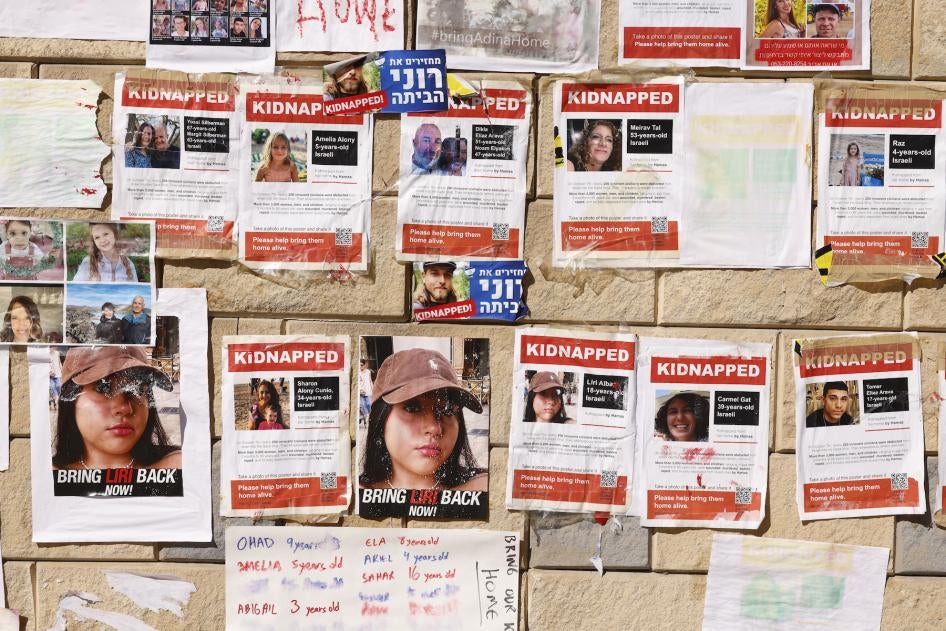(Jerusalem) – The practice by Hamas and Islamic Jihad of publicly releasing videos of Israeli hostages is a form of inhumane treatment that amounts to a war crime, Human Rights Watch said today.
On November 9, 2023, Islamic Jihad released a video showing two Israeli hostages, including a child, asking to be released. It is the third such video that the armed groups have released since taking more than 240 people hostage from southern Israel on October 7.
“Hamas and Islamic Jihad are not only unlawfully holding civilians hostage, including children, but they’re also broadcasting the hostages’ images to the world in their most vulnerable state,” said Omar Shakir, Israel and Palestine director at Human Rights Watch. “Instead of filming a child under duress, the groups should release him safely to his family.”
Both holding hostages and committing “outrages upon personal dignity” of detainees are serious violations of international humanitarian law, or the laws of war. Instead of fulfilling their obligation to allow the hostages to contact their families, Hamas and Islamic Jihad are issuing public video statements that may constitute coercion.
Hamas and Islamic Jihad should immediately and unconditionally release all civilians in their custody and allow those still being held to communicate with their families through private means and to receive visits by an impartial humanitarian agency.
The video released on November 9 purported to show two hostages, identified as Hannah Katzir and 13-year-old Yagil Yaakov from Nir Oz in southern Israel, speaking in Hebrew and asking the Israeli government to reach an agreement to bring them home. Israeli media listed Katzir’s age as 77. In the video, Yaakov was filmed thanking Islamic Jihad fighters for “protecting” him.
Hamas has previously released two similar videos, also showing hostages asking to return home. As in a previous video, the two hostages criticized the policies of Israeli Prime Minister Benjamin Netanyahu and said they were being treated well.
In a video released just prior, a masked man speaking in Arabic refers to the two hostages, saying that Saraya Al-Quds, the Islamic Jihad military wing, was ready to release Katzir and Yaakov for “humanitarian reasons,” and claiming the Israeli blockade of Gaza could make it too difficult to provide them with health care. The caption associated with this video names the man as Abu Hamza, spokesperson for Saraya Al-Quds. The videos appear to have been first posted to a Telegram account claiming to be linked to Saraya Al-Quds. Human Rights Watch could not find versions of these videos online prior to November 9.
In an audio clip from a Facebook post, Renana Gome identified herself as the mother of Yagil Yaakov and his 16-year-old brother Or, and said the boys were both kidnapped from their home in Nir Oz on October 7. The story of the boys being kidnapped was featured in a short animated film that Gome posted to her Facebook page.
On October 7, Hamas-led gunmen attacked southern Israel, massacring hundreds of civilians and taking more than 240 hostages, according to Israeli authorities. The hostages taken by Hamas and Islamic Jihad included children and older people. Four female hostages have since been released, and the Israeli military freed a fifth hostage during ground operations. In addition, Hamas has unlawfully held hostage two Israeli civilians with mental health conditions since 2014 and 2015.
Israel responded to the attack by cutting off electricity and water to Gaza and blocking the entry of fuel, food, and all but a trickle of humanitarian aid, which exacerbates the impact of the 16-year Israeli closure and amounts to collective punishment, a war crime. Israeli forces are also carrying out an intensive aerial and ground offensive in Gaza. According to authorities in Gaza, nearly 11,000 Palestinians, including more than 4,000 children, have been killed there since October 7. Hamas and Islamic Jihad have made statements since the start of the hostilities indicating that they would be willing to release more hostages in exchange for release of Palestinian prisoners, including some 2,000 Palestinians that Israeli authorities hold in administrative detention without trial or charge.
International humanitarian law requires the Palestinian armed groups to immediately and unconditionally release all civilians held as hostages.
Hamas and other Palestinian armed groups unlawfully paraded some of the hostages in public when they took them to Gaza and made photos and videos of them public. Hamas should either allow those in custody to contact their families directly or by providing information to an independent humanitarian agency such as the International Committee of the Red Cross.
Common Article 3 of the four Geneva Conventions of 1949, which applies to all parties to the armed conflict in Israel and Palestine, provides that everyone in the custody of a warring party “shall in all circumstances be treated humanely.” Acts prohibited include “outrages upon personal dignity, in particular humiliating and degrading treatment.” Violations of Common Article 3 are war crimes.
The Elements of Crimes of the International Criminal Court, which has jurisdiction in Palestine, defines “outrages upon personal dignity” as an act in which “[t]he perpetrator humiliated, degraded or otherwise violated the dignity of a person and ‘[t]he severity of the humiliation, degradation or other violation was of such degree as to be generally recognized as an outrage upon personal dignity.” Subjecting hostages to the spectacle of a public video is an outrage on personal dignity, Human Rights Watch said.
“Abduction” is one of the six grave violations against children enumerated by UN Security Council resolutions.
“The families of the hostages held in Gaza are desperate for communication from their loved ones,” Shakir said. “Hamas and Islamic Jihad should release the civilians held or at least let them contact their families privately and with dignity.”









